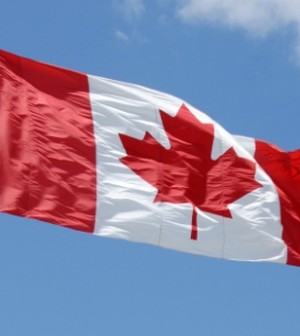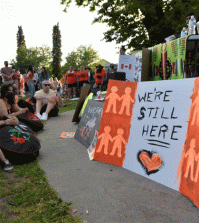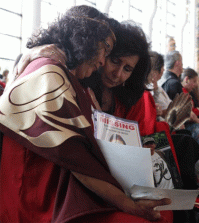- Finding Unshakable Power in a World That Wants to Pull Us ApartPosted 5 months ago
- What could a Donald Trump presidency mean for abortion rights?Posted 5 months ago
- Financial Empowerment: The Game-Changer for Women in Relationships and BeyondPosted 6 months ago
- Mental Health and Wellbeing Tips During and After PregnancyPosted 6 months ago
- Fall Renewal: Step outside your Comfort Zone & Experience Vibrant ChangePosted 6 months ago
- Women Entrepreneurs Need Support SystemsPosted 7 months ago
oh, canada: pay inequity from sea to sea

By Jennifer Heard.
Why would a woman need pay equity when she can just marry a rich man? This sexist joke sparks anger because it suggests that: 1.) a woman, if beautiful and smart enough, will find a rich man to “take care of her;” 2.) a woman shouldn’t really have to work; her role is to be a wife, mother, and homemaker; and, 3.) a woman doesn’t earn “real” money, it’s just a little extra pin money to pay for luxuries. This sexist joke also causes despair because, although pay equity is an important issue for which two generations of women have fought, it is still not a fundamental right in North America.
It is a telling fact that no country in the world has achieved wage equality between men and women. Statistics reveal that the pay gap is as high as 50% in developing countries and as low as 12% in Nordic countries.
In Canada, the wage gap is 28%.
The justifications for this gender wage gap include workforce segregation between the sexes, and endless hairsplitting on what constitutes the legal definition of equal pay for work of equal value. Feminists in Canada have rallied to the pay equity cause since 1970, but their efforts have been sidetracked by other political priorities.
The recognition that pay equity was a human injustice that needed to be redressed dates back to 1948 when the UN passed the Universal Declaration of Human Rights (article 23) which committed governments around the world to ensure the right of women to be free from pay discrimination.
In 1963, the U.S. signed the Equal Pay Act but its enforcement was so ineffective that it was not until January 2009 that the Paycheck Fairness Act was signed into law by President Barack Obama after being introduced by former Senator Hillary Clinton.
Historically, women began to enter the workforce in increasing numbers with the advent of WWI. In 1901, women represented 14.4 % of the workforce and by 1961, the female percentage had more than doubled to 29.3%.
By 2001, some 71% of women were employed which represented 46% of the total labor force.
But today, the paychecks that women take home in Canada equal only 72% of men’s paychecks.
Part of the reason for this salary imbalance is that women are not protected under the law.
Because they don’t work for a public service employer like the government or are not unionized employees as are health care workers, teachers, and transit workers, they are not covered by pay equity legislation. Additionally, women tend to be trapped in the pink collar ghetto of women’s work such as nursing, daycare, sales, service, and clerical work. It is actually because of this pink ghetto that courts have difficulty in comparing equal pay for work of equal value because very few men work in these sectors.
Why is pay equity last in line when it comes to political and legislative priorities?
Many believe it is because women are socialized to be sacrificial lambs and therefore will be the first to accept hardship for the greater good of their family and country. Others think the social perception persists that men require a family wage while women work only for a supplementary wage and therefore are deemed to be worth less. In the end, it comes down to a subjective value judgment and society has still not resolved the question of whether caring for people (a nurse or a childcare worker) is worth the same, more, or less than picking up garbage or delivering mail?
It’s about time for women’s groups, faced with the uncontested fact that a woman in a full-time job earns 72 cents for every dollar a man earns, to climb on the political bandwagon. Women can no longer accept to be sacrificial lambs on the altar of economic hardship. The rocky road to pay equity in Canada has lasted more than half a century and time is of the essence. So far, the struggle of Canadian women for pay equity is a “long walk to freedom” with many unnecessary detours and untold casualties along the way.
 Jennifer Heard is a 26-year-old from Toronto, Ontario. In 2010 she obtained an honors degree in political science and French and has worked on over a dozen Canadian political campaigns since 2006. Today Jennifer is busy arguing her point of view due to her passion for women’s rights.
Jennifer Heard is a 26-year-old from Toronto, Ontario. In 2010 she obtained an honors degree in political science and French and has worked on over a dozen Canadian political campaigns since 2006. Today Jennifer is busy arguing her point of view due to her passion for women’s rights.
Sources:
No Author, “Pay Equity,” Campaigns Representing Public Sector Unions Globally
(2006): Public World-PSI 27 March, 2009
Mary Cornish, “Premier McGuinty Must End Ontario’s Violation of UN Pay Equity Standards or Face UN Complaint,” Equal Pay Coalition (2008)
No Author, “What People Are Saying About Fair Pay,” Pay Equity Information (2009): National Committee on Pay Equity 19 Feb. 2009
Jacquette Newman and Linda White, Women, Politics and Public Policy: The Political Struggles of Canadian Women (Toronto: Oxford University Press, 2006) 203.






